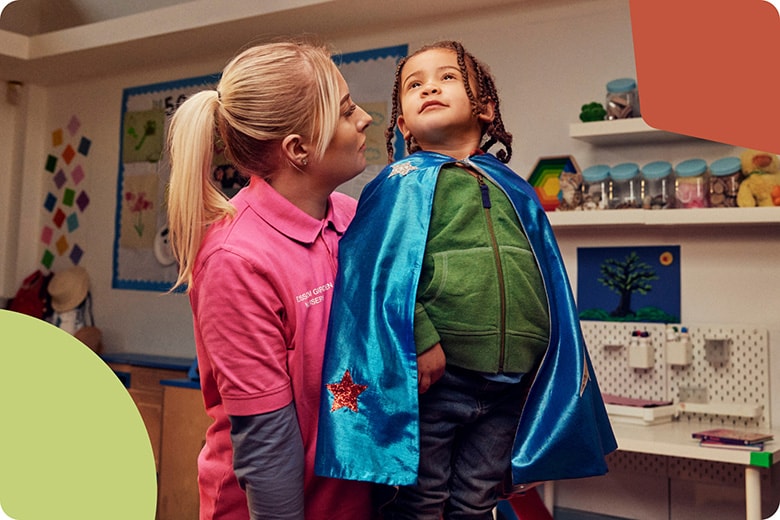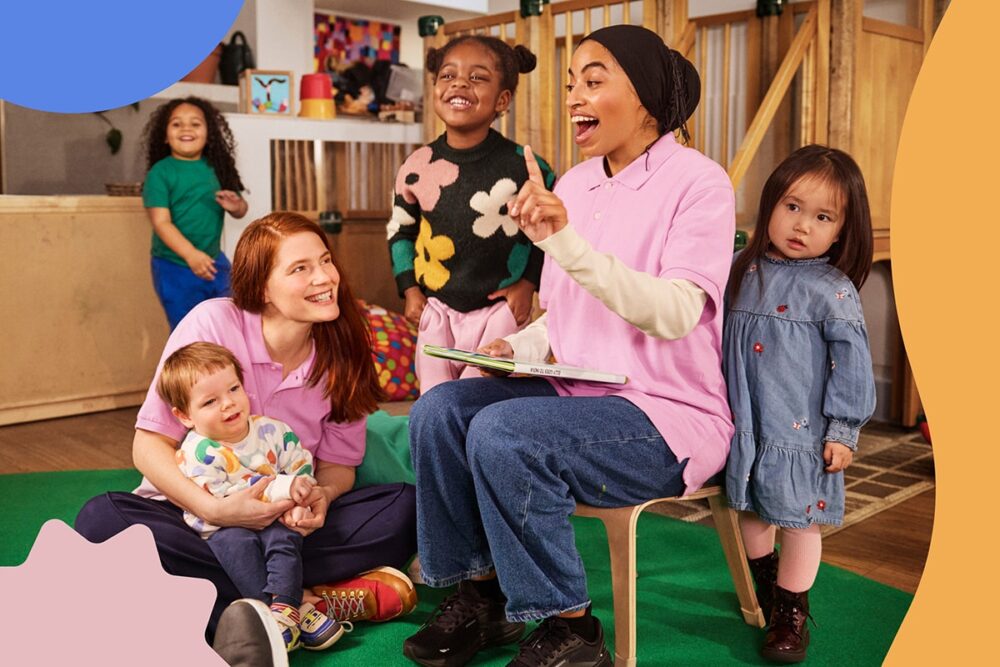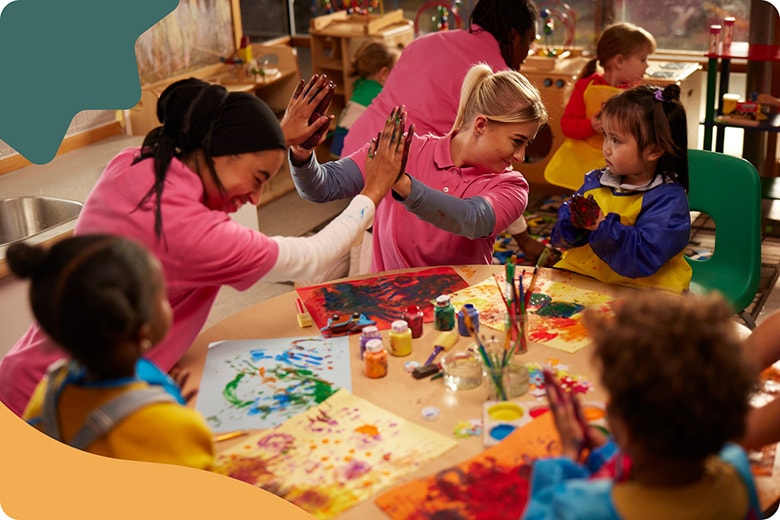Getting started and progression
The early years sector offers something rare: the chance to do something truly big while building a career that works for you.
Getting started in Early Years
Whether you are just starting out, changing direction or looking to progress, there is a clear pathway into an early years career. There are early years jobs near you, including a wide range of nursery jobs, where you can start gaining experience and earning straight away.
Work in an unqualified role
Jump straight in as a nursery assistant or early years practitioner. You’ll work under supervision, supporting qualified staff and getting hands-on experience with children. Search for early years jobs straight away.
Although you don’t need a specific qualification to start your career in early years and childcare it’s something that nurseries and pre-schools often look for. Also, there are some roles where you will need to have an approved qualification.
Already Qualified
If you already have a qualification that you think might allow you to work with children, it is important to check if it is an approved qualification. Ask your training provider if the qualification:
- has been approved by the Department for Education
- will let you work as a level 2 or level 3 member of staff
You can also use the early years qualifications checker.
If you are thinking of doing a course, speak to the training provider about recognition of prior learning. This means a training provider may offer to assess your prior learning to see whether they can credit you for learning you’ve already done. This could lead to you being able to complete a course more quickly.
Many training providers have their policies on recognising prior learning online. This will explain who is eligible, what evidence they need from you and how their process works.
Apprenticeships: earn while you learn
Apprenticeships combine real work with training and study for a specific role. You’ll learn new skills, gain experience and earn a salary too. There are two entry-level early years apprenticeships:
- level 2 early years practitioner (equivalent to GCSEs)
- level 3 early years educator (equivalent to A Levels)
Both apprenticeships are suitable for those with no previous experience. Level 2 may be more suitable for those leaving school at 16. It allows you to work in an early years setting under supervision. It is an excellent entry point into the sector.
Level 3 may be more suitable for those who want to plan, organise and lead learning activities, and perhaps supervise others.
For more information head to our Apprenticeships page: Early Years Apprenticeships – Early Years Careers
Study first, then start qualified
Prefer to get your qualification before you begin? Study at school, college or university. You’ll learn in a classroom with practical placements, then start work as a qualified member of staff.
You can get approved qualifications through a range of training providers, such as:
- level 2 courses (equivalent to GCSEs)
- level 3 courses (equivalent to A Levels)
- the T Level in education and early years (broadly equivalent to three A Levels)
- early years degrees
To find out what training is available where you live, speak to your local college, training provider or careers service. If you decide to work towards a qualification, it’s important check if it is an approved qualification.
Ask your training provider if the qualification:
- has been approved by the Department for Education
- will let you work as a level 2 or level 3 member of staff
You can get free level 3 early years qualifications if you:
- don’t already have a level 3 or higher qualification
- are unemployed or earning below the National Living Wage annually – this is regardless of any other qualifications you hold
You can also get free maths level 2 courses if you do not already have a GCSE in maths at grade 4 (or equivalent).
Become a childminder
Register with Ofsted or a childminder agency and set up your own early education and childcare business. Work from home or a local space – like a community centre, set your own hours, and build relationships with families in your community.
If you want to work as a childminder, you’ll need relevant first aid and childcare training. Check what else you’ll need to become a childminder.
Build your experience
Ready for more responsibility? This is where your career opens up. Once you’ve got experience and confidence, you can specialise in areas you’re passionate about, take on leadership responsibilities, or even start your own business.
Lead a room
Run your own room within a setting. Plan engaging, educational activities that help children learn and grow. Support and guide colleagues. It’s about creating the kind of environment where children thrive—and you’re in charge of making that happen.
Specialise in an area
Become the expert others turn to. You could focus on supporting children with Special Educational Needs, become a safeguarding lead, or train as a mentor helping others develop their careers. These roles let you make a bigger impact in the areas that matter most to you.
Grow as a childminder
As your childminding business develops, you can hire an assistant, offer more childcare places, team up with other childminders, or even open your own nursery. It’s a route into running a business whilst staying close to what you love – working with children.
Lead, manage and shape the future
Experienced and ready to lead? With experience and qualifications behind you, you’re ready to lead teams, shape how things are run, and influence the careers of others.
Become an early years teacher
You’ll need Early Years Teacher Status (EYTS) or Qualified Teacher Status (QTS), gained through a Level 6 degree, but it opens the door to one of the most influential roles in early years. From September 2026, you can even train through a Level 6 degree apprenticeship, meaning you are employed and earn while you learn.
Manage a team
Guide staff, shape the curriculum, and lead others in their careers. You’re not just managing day-to-day operations – you’re creating a culture where your team feels supported and children receive the best possible start. You’ll need at least a Level 3 qualification to step into management.
Run your own early education provision
Open your own nursery or pre-school. You’ll handle everything from staffing to curriculum design, business development to community relationships. This is the level where your decisions ripple outwards. The culture you create shapes hundreds of children’s early experiences.
Become an Early Years Teacher
To get started, you’ll need GCSEs in English, maths and science at grade C/4 or above (or equivalent).
If you’re not a UK citizen, you can still apply as long as you meet the academic entry criteria and immigration permissions for non-UK candidates.
If you don’t have GCSEs, you’ll need an equivalent qualification in English, maths and science.
If you’re applying for postgraduate training, you’ll need a bachelor’s degree or something equivalent – for example, a vocational or professional qualification, or a qualification gained outside the UK.
There are a few different ways you can do your Early Years Initial Teacher Training (EYITT):
- Postgraduate training: for people with a degree who want to study full time to gain Early Years Teacher Status.
- Postgraduate employment-based training: a good option if you already work in an early years setting and want to earn while you work towards your Early Years Teacher Status (EYTS).
- Postgraduate assessment only: if you’re an experienced graduate who already meets the early years teachers’ standards, you might be able to achieve EYTS without additional training. This is a self-funded option.
- Undergraduate training: if you’re looking to study for a full-time degree, this route lets you gain a bachelor’s in an early childhood-related subject, and become an early years teacher (with EYTS) by the time you graduate.
All routes lead to Early Years Teacher Status (EYTS), which opens doors to roles in private, voluntary and independent nurseries, academy and free school nursery classes, and independent school infant classes. It’s also a strong progression route for childminders and early years staff looking to develop leadership skills and take on more responsibility. You’ll learn how to plan and deliver great lessons, lead teams and work with families and other professionals and help run and improve an early years setting
Ready to apply? You’ll need to apply directly through an accredited early years training provider. You can find a list of early years initial teacher training providers on GOV.UK.
There’s also funding available for many of these routes, depending on your circumstances. You can read the full 2025 to 2026 funding guidance on GOV.UK.
Early Years Teacher Degree Apprenticeship
You can also consider doing a Level 6 Degree Apprenticeship, where you’ll train, earn, and qualify as an Early Years Teacher – and you don’t need any previous experience to get going.
You can apply if you have:
- GCSEs in English, maths, and science (grade C/4 or above)
- any Level 3 qualification (equivalent to an A Level)*
- lived in England for the last 3 years or more
If you do not have a GCSE in English or Maths, you might qualify for a free course to improve your skills to gain them.
*We recommend that trainees hold a Level 3 qualification to demonstrate a minimum level of educational attainment. However, if someone does not have this, they may be able to demonstrate equivalence through an appropriate assessment, at the discretion of training providers.
This route suits both complete beginners and current early years staff or childminders who want to gain a degree and EYTS while working.
Once qualified, you can teach in private, voluntary and independent nurseries, academy and free school nursery classes, and independent school infant classes. It’s also a great option for childminders wanting to progress.
You’ll learn to plan lessons, lead teams, work with families and agencies, and help run an early years setting.
This new apprenticeship starts in 2026.
Experience-based route
The experience-based route for early years allows suitable staff to be included in the staff:child ratios at level 3 following a period of supervised practice. You may be eligible for this route if you hold either:
- A level 2 qualification that has been approved by the Department for Education as full and relevant; or
- A level 3 or above qualification that has not been approved by the Department for Education but is relevant to the care and education of children.
You must also have worked with early years children (aged 0-5) in an early years setting or related sector for at least one year.
The experience-based route is undertaken while working at an early years provider, and it is at the provider’s discretion whether they wish to offer this pathway to their staff.
If you are interested in this route, discuss this with your employer to understand if it is available at your early years setting and if you are eligible.
Free online training courses
Whether you are looking into early years jobs or already working with small children, there are childcare training courses that can help you take the next step or build on the skills you have.
Early years child development training
There’s no experience required to take this free online early years child development course.
If you’re already working in early years, the course will build and strengthen your existing knowledge of child development.
If you’re just starting out, then it will give you invaluable new insights.
You can choose to do this online course whenever suits you and you’ll get a certificate for each module you complete.
Skills Bootcamps
Skills Bootcamps are free, flexible courses of up to 16 weeks.
They are perfect if you are looking to change careers or progress in your existing early years role.
Once you complete the Skills Bootcamp, you’ll have the opportunity to move into an accelerated level 3 early years educator apprenticeship.
Search for an early years educator Skills Bootcamp near you.
Whatever stage you’re at, there are roles near you that play to your strengths and let you shape your early years career path, while making a real difference.
Ready to take the next step?
Find early years jobs near you across nurseries and pre-schools, and explore childminding opportunities in your area.
See where an early years career can take you
Watch these stories to see how other people have shaped their careers, built new skills and created real impact in the early years sector.
Real stories
Explore more inspiring stories from real early years educators.

Help and support
Want to talk it through? Our support team is ready to help.


